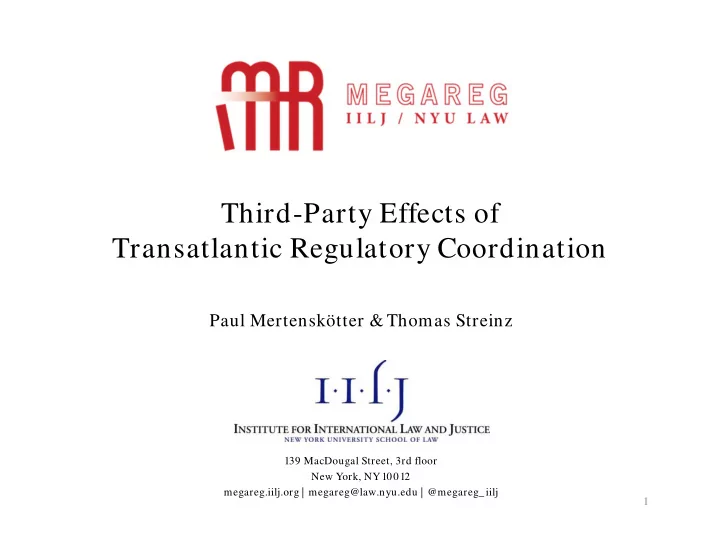

Third-Party Effects of Transatlantic Regulatory Coordination Paul Mertenskötter & Thomas Streinz 139 MacDougal Street, 3rd floor New York, NY 10012 megareg.iilj.org | megareg@law.nyu.edu | @megareg_iilj 1
The megaregionals may transform global and national regulation 2
TTIP aims to set global standards and establish a certain regulatory approach Michael Froman (ANSI Speech, 30 September 2013): • “T-TIP should be an opportunity to set a high standard for global standard-setting … ” Cecilia Malmström (Tagesspiegel Interview, 28 July 2015): • “If we set these common standards together, they will apply globally. If we miss this chance, others will set global standards – but at a much lower level.” The global diffusion of TTIP-originating substantive product standards and rules for conformity assessment has significant effects for producers and consumers around the world. 3
Non-TTIP states are diverse in their regulatory needs and economic exposure to TTIP regulation 4
Example: Food regulations impose significant trade costs on third states Regulation of food content and process • (esp. traceability) has significant effects on third-party producers Challenge to find an informed, rational and reasoned regulatory solution that considers health and safety concerns as well as third party distributional effects See: Klaus Frohberg et al., EU Food Safety Standards, Traceability and Other Regulations: A Grow ing Trade Barrier to Developing Countries’ Exports?, Paper Presentation, August 2006 5
TTIP’s institutions should be legally required to consider third party effects The regulatory cooperation body should be required to ensure wide • and balanced representation, including of non-EU/ US interests (see Art. 15.2 of EU’s Text. Prop., 10 Feb. 2015) International law is moving toward other-regarding obligations for • states (International Court of Justice, Pulp Mills, April 2010) U.S. regulatory practice already requires consideration of trade • effects with other nations (Executive Order 13609, Office of Management and Budget, Circular A-4) 6
Establish proactive procedures to consider third party effects Global Administrative Law principles of transparency, participation, reason giving, review and legal accountability. Regulatory Impact Assessments to account for third party trade effects and consumer preferences. TTIP Ombudsperson to represent interests of the excluded and under-included. 7
megareg.iilj.org @megareg_iilj megareg@law.nyu.edu 8
Recommend
More recommend